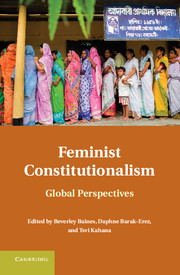Book contents
- Frontmatter
- Contents
- Foreword
- Contributors
- Introduction
- Part I Feminism as a Challenge to Constitutional Theory
- Part II Feminism and Judging
- Part III Feminism, Democracy, and Political Participation
- Part IV The Constitutionalism of Reproductive Rights
- Part V Women's Rights, Multiculturalism, and Diversity
- Part VI Women between Secularism and Religion
- 22 Secular Constitutionalism and Muslim Women's Rights
- 23 On God, Promises, and Money
- 24 Polygamy and Feminist Constitutionalism
- Index
- References
22 - Secular Constitutionalism and Muslim Women's Rights
The Turkish Headscarf Controversy and Its Impact on the European Court of Human Rights
Published online by Cambridge University Press: 05 June 2012
- Frontmatter
- Contents
- Foreword
- Contributors
- Introduction
- Part I Feminism as a Challenge to Constitutional Theory
- Part II Feminism and Judging
- Part III Feminism, Democracy, and Political Participation
- Part IV The Constitutionalism of Reproductive Rights
- Part V Women's Rights, Multiculturalism, and Diversity
- Part VI Women between Secularism and Religion
- 22 Secular Constitutionalism and Muslim Women's Rights
- 23 On God, Promises, and Money
- 24 Polygamy and Feminist Constitutionalism
- Index
- References
Summary
Point of Departure
In recent years, there have been major public debates in several European countries about the acceptability of Muslim females wearing a headscarf or hijab. Excluding religiously devoted Muslim women from education and public services in some countries raises serious human rights violations in societies that would otherwise qualify as liberal democracies. In this chapter I explore the recent Turkish headscarf controversy that led Turkey to political turmoil to show its complex implications on domestic and transnational legal order. The Turkish headscarf controversy is one of the earlier and deeply complex cases. Furthermore, the Turkish reliance on secularism to justify denying women who wear headscarves into public spaces became a model legal argument for European courts. Turkey is a unique example from the perspective of secularism and religiosity because despite its “strictly secular” governmental structure, the overwhelming majority of its population adheres to what I call “societal Islam.”
The headscarf controversy also situated freedom of religion in context of gender claims and Islamic culture. Articulating the specific problem in relation to Muslim women raises complex arguments about the supposed incompatibility between women's rights and Islam. Especially after the 9/11 attacks on the United States, stereotyping of Islamic societies became widespread and fear of political Islam created a real concern in mainstream American and European public opinion. The general public has engaged in racial profiling, which has produced incidents of violence, including attacks on women wearing headscarves. This eventually gave rise to racialization of Muslims by way of construction of the “Muslim women's outlook.” Judicial cases provide an undeniable argument that emerging Islamophobia in the West and elsewhere negatively affects Muslim women's daily life, education, and participation in the workplace. There are a range of policy outcomes and various degrees of tolerance and/or discrimination against Muslim women because of uneven domestic political matters, cultural differences, and constitutional orders of various countries.
- Type
- Chapter
- Information
- Feminist ConstitutionalismGlobal Perspectives, pp. 413 - 432Publisher: Cambridge University PressPrint publication year: 2012

